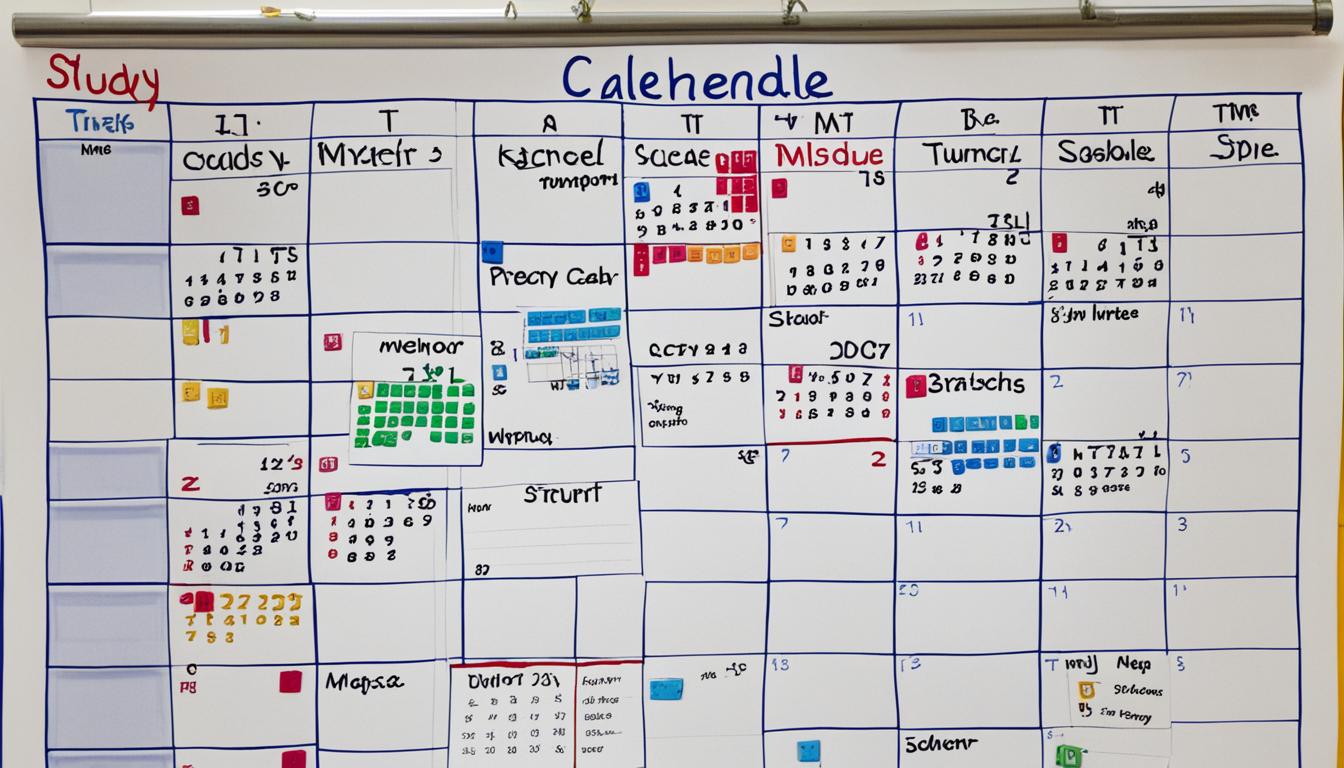Maximize Learning: Block Time to Study Regularly

“The more that you read, the more things you will know. The more that you learn, the more places you’ll go.” – Dr. Seuss
When it comes to achieving academic success, one of the most crucial aspects is effective time management. It’s not enough to simply cram for exams or study sporadically. To truly maximize your learning potential, you need to block time on a calendar to study regularly. By creating a study schedule and dedicating specific time slots for focused learning, you can establish a routine that promotes deep understanding, long-term memory retention, and overall academic excellence.
Research has shown that common study techniques, such as reading in the same location or cramming for exams, may not be as effective as we once thought. Instead, spacing out study sessions over a longer period of time has been proven to improve long-term memory. Interweaving tasks and subjects can enhance learning by aiding in the retrieval process and facilitating a deeper understanding of the material. Additionally, testing oneself has been found to strengthen long-term learning by promoting recall and retrieval of information.
By incorporating these principles into your study routine and blocking time on a calendar, you can harness the power of consistent and focused learning. Whether you’re a student aiming for top grades or a lifelong learner seeking personal growth, prioritizing regular study sessions will open doors to new knowledge and endless possibilities.
Key Takeaways:
- Blocking time on a calendar to study regularly is essential for maximizing learning potential.
- Spacing out study sessions over a longer period of time improves long-term memory retention.
- Interweaving tasks and subjects aids in the retrieval process and promotes a deeper understanding of the material.
- Testing oneself strengthens long-term learning by promoting recall and retrieval of information.
- By harnessing the power of consistent and focused learning, you can unlock endless possibilities for personal growth and academic excellence.
The Benefits of Blocking Study Time
When it comes to effective study habits, one of the most valuable strategies is blocking study time on your calendar. This simple yet powerful technique offers numerous benefits that can significantly enhance your learning experience and improve your overall academic performance.
Blocking study time allows you to break down your tasks and assignments into manageable chunks. By allocating dedicated periods for studying, you ensure that you have enough time to thoroughly understand and complete them without feeling overwhelmed or rushed. This not only increases your productivity but also reduces stress levels, enabling you to approach your studies with a clear and focused mind.
Furthermore, blocking study time helps you prioritize your studies and align them with other commitments in your life. By scheduling specific time slots for studying, you can effectively balance your academic responsibilities with work, hobbies, and personal obligations. This strategic approach to time management empowers you to create a study routine that integrates seamlessly with your daily life, resulting in greater efficiency and effectiveness.
Another significant benefit of blocking study time is its positive impact on learning retention and memory. Research has shown that spacing out study sessions over time enhances long-term memory and promotes better information retrieval. When you block time for studying, you automatically space out your learning sessions, allowing your brain to process and consolidate the information more effectively. This improves your ability to remember and recall the material, leading to deeper learning and better performance on exams and assignments.
Creating a study schedule through the practice of blocking study time on your calendar is a powerful tool for time management. It helps you stay organized, plan ahead, and stay accountable to yourself. By committing to a consistent study routine, you develop discipline and habituation, which are essential for academic success.
So, start reaping the benefits of blocking study time and unleash your full learning potential. Take control of your schedule, prioritize your studies, and watch as your knowledge deepens, your memory improves, and your academic performance soars.

Creating a Study Schedule
When it comes to effective time management and establishing a study routine, creating a study schedule is key. By allocating specific time slots for studying, you can ensure that you stay on track and make the most of your study sessions. Here are two popular methods for creating a study schedule: utilizing a daily schedule template and adopting the time blocking method.
Utilizing a Daily Schedule Template
If you prefer a more structured approach, using a daily schedule template can be immensely helpful. These templates provide a ready-made framework for organizing your day and allocating dedicated time for studying. You can find various templates online or create your own, tailored to your specific needs and preferences.
With a daily schedule template, you can easily outline your study sessions and prioritize your tasks. By filling in the available time slots on the template, you ensure that studying becomes a routine part of your day. This method helps you stay organized, eliminate distractions, and overcome procrastination.
| Time | Activity |
|---|---|
| 8:00 AM – 9:00 AM | Breakfast and Morning Routine |
| 9:00 AM – 10:30 AM | Study Session 1 |
| 10:30 AM – 10:45 AM | Short Break |
| 10:45 AM – 12:15 PM | Study Session 2 |
| 12:15 PM – 1:00 PM | Lunch Break |
| 1:00 PM – 2:30 PM | Study Session 3 |
| 2:30 PM – 2:45 PM | Short Break |
| 2:45 PM – 4:00 PM | Study Session 4 |
As you can see from the example above, the daily schedule template allows you to divide your day into manageable blocks and allocate dedicated time for studying. By adhering to this schedule and making studying a priority, you can establish a consistent study routine and make significant progress in your academic pursuits.
The Time Blocking Method
If you prefer a more detailed and structured approach to time management, the time blocking method may be the right choice for you. This method involves creating a comprehensive schedule that outlines how you will spend every minute of your day. By blocking out specific time slots for each activity, including studying, you can manage your time more effectively and maximize your productivity.
When using the time blocking method, it’s essential to analyze your current commitments and evaluate your learning style. Consider your daily responsibilities, such as work, extracurricular activities, and personal commitments. By understanding your existing commitments, you can allocate sufficient time for studying without sacrificing other important aspects of your life.
Additionally, setting realistic goals is crucial for effective time management. Break down your study sessions into smaller, actionable steps that align with your learning objectives. This approach not only helps you stay focused but also gives you a sense of accomplishment as you complete each task.
By creating a study schedule using a daily schedule template or the time blocking method, you can establish a structured study routine and effectively manage your time. Analyze your current commitments, evaluate your learning style, and set realistic goals that align with your academic aspirations. Remember, a well-planned study schedule is the foundation for productive study sessions and academic success.
Strategies for Effective Time Management
Effective time management is crucial for students to excel in their studies and achieve their academic goals. By implementing proven strategies, you can optimize your productivity, stay organized, and make the most of your time. Here are some effective time management strategies that can help you take control of your schedule:
1. Prioritization
Prioritization is key to effective time management. Start by identifying the most important tasks or assignments and tackle them first. By focusing on high-priority items, you ensure that you allocate your time and energy to the most crucial aspects of your studies.
2. Realistic Goal-Setting
Setting realistic goals is essential for effective time management. Break down larger goals or projects into smaller, actionable steps. This approach helps you stay motivated and ensures that you make progress towards your objectives.
3. Breaking Tasks into Smaller Actionable Steps
Break down complex tasks or assignments into smaller, more manageable steps. This allows you to approach them systematically and prevents you from feeling overwhelmed. By focusing on one step at a time, you can make steady progress towards completing your tasks.
4. Understanding Energy Patterns
Everyone has natural energy highs and lows throughout the day. Pay attention to your energy patterns and schedule tasks accordingly. For example, if you tend to have more energy in the morning, allocate your most challenging or important tasks during that time to maximize your productivity.

5. Taking Breaks and Avoiding Multitasking
Taking regular breaks is essential for maintaining focus and productivity. Schedule short breaks between study sessions to recharge and relax. Avoid multitasking as it can lead to decreased efficiency and errors. Instead, focus on one task at a time to ensure quality and accuracy.
6. Building Routines and Habits
Establishing consistent routines and habits can significantly improve time management. Dedicate specific time slots for studying, completing assignments, and engaging in other activities. By following a structured routine, you develop a sense of discipline and make efficient use of your time.
By implementing these effective time management strategies, you can enhance your productivity, reduce stress levels, and achieve success in your studies. Remember, developing good time management habits takes practice and persistence, but the rewards are well worth the effort.
Evaluating Your Time Usage
In order to improve your time management habits, it is crucial to analyze how you currently spend your time. By evaluating your time usage, you can identify tasks that consume excessive amounts of time and recognize patterns that affect your productivity. This assessment allows you to make the necessary adjustments to your schedule, allowing for more efficient allocation of time.
Start by examining the tasks that take up a significant portion of your day. Are there any activities that could be delegated or eliminated altogether? By identifying time-consuming tasks, you can find ways to streamline or reduce their impact on your schedule.
Furthermore, be mindful of patterns that affect your productivity. Do you tend to be more focused and efficient during certain times of the day? Recognizing productivity patterns can help you plan your schedule accordingly, allocating time for complex or challenging tasks during your peak performance hours.
Once you have evaluated your time usage, it’s time to adjust your schedule. Prioritize tasks based on importance and urgency, ensuring that you allocate sufficient time for high-priority responsibilities. Make use of tools such as time blocking to allocate specific time slots for different tasks, providing structure and clarity to your schedule.
In addition, take note of any potential distractions that may hinder your productivity. Consider implementing strategies to minimize distractions, such as turning off notifications or creating a dedicated workspace free from interruptions.
Remember to be flexible with your schedule and make adjustments as needed. Regularly evaluating your time usage will allow you to refine your time management habits and optimize your productivity.
Benefits of Evaluating Your Time Usage:
- Identify time-consuming tasks
- Recognize productivity patterns
- Adjust your schedule for optimal time allocation
- Minimize distractions and improve focus
- Optimize productivity and reduce stress levels
- Achieve a better work-life balance

Time Management Techniques for Better Productivity
Implementing various time management techniques can significantly improve productivity. By utilizing these techniques, you can better allocate your time, set priorities, and effectively plan your tasks. This section will explore some of the most effective techniques for time management, including time blocking, setting priorities, task delegation, and developing focus and concentration skills. These techniques not only enhance productivity but also reduce stress levels, allowing you to work efficiently and achieve your goals.
1. Time Blocking
Time blocking is a powerful technique that involves scheduling specific blocks of time for different tasks or activities. By designating dedicated time slots on your calendar for important tasks, you can ensure that you prioritize and devote focused attention to them. This technique helps prevent time wasted on less important tasks and minimizes the risk of distractions derailing your productivity. By structuring your time with clear boundaries, you can complete your tasks more efficiently and make progress towards your goals.
2. Setting Priorities
Setting priorities is essential for effective time management. It involves identifying and ranking tasks based on their importance and urgency. By determining which tasks require immediate attention and which can be addressed later, you can allocate your time and resources more effectively. Prioritizing tasks helps you avoid spending excessive time on less critical or non-essential activities, enabling you to focus on what truly matters. By completing high-priority tasks first, you achieve a sense of accomplishment and maintain your productivity momentum.
3. Task Delegation
Task delegation is an important skill that can help you effectively manage your workload. It involves assigning tasks to others who are capable of handling them, allowing you to focus on higher-priority tasks or those that align more closely with your expertise. Delegating tasks not only reduces your workload but also empowers others to contribute and grow. By leveraging the strengths and skills of your team or network, you can enhance overall productivity and achieve better results collectively.
4. Focus and Concentration
Developing focus and concentration skills is vital for maintaining productivity and minimizing distractions. With numerous demands for attention in today’s fast-paced world, it’s important to cultivate the ability to concentrate on a single task without being easily swayed by interruptions or irrelevant stimuli. Techniques such as mindfulness meditation, eliminating distractions, and practicing deep work can help improve your focus and concentration. By dedicating uninterrupted time to your most important tasks, you can enhance your productivity and achieve better outcomes.

These time management techniques, including time blocking, setting priorities, task delegation, and developing focus and concentration skills, are effective tools for better productivity and stress reduction. By incorporating these techniques into your daily routine, you can maximize your time, accomplish more, and experience a greater sense of control over your tasks and responsibilities.
Maintaining Balance and Well-being
Effective time management is key to achieving academic success, but it also plays a crucial role in maintaining a healthy work-life balance. In the midst of your busy student life, it’s important to prioritize self-care and make time for relaxation and rejuvenation. By incorporating activities such as exercise, hobbies, spending quality time with loved ones, and ensuring you get enough sleep, you can achieve a balanced and fulfilling lifestyle.
Managing your time effectively not only helps you stay on top of your academic commitments but also reduces stress levels and improves your overall well-being. Remember, taking care of yourself is just as important as studying. By dedicating time to self-care, you’ll be better equipped to manage the demands of student life and find greater satisfaction in your accomplishments.
Work-Life Balance
Striking a balance between your studies and personal life is essential for your long-term success and happiness. It’s all too easy to become consumed by coursework and deadlines, but neglecting other important aspects of your life can lead to burnout and diminish your overall well-being.
By implementing effective time management techniques, you can create dedicated blocks of time for both your academic pursuits and personal interests. This allows you to maintain a healthy equilibrium, ensuring that you can enjoy your studies while still engaging in activities that bring you joy and fulfillment.
Self-Care
Self-care is vital for your mental, emotional, and physical well-being. It involves prioritizing your own needs and engaging in activities that promote relaxation, self-reflection, and personal growth. Taking care of yourself not only boosts your mood and energy levels but also enhances your ability to focus and perform at your best academically.
When managing your time, be sure to allocate moments for self-care. Incorporate activities that bring you joy and help you recharge, such as taking walks in nature, practicing mindfulness or meditation, journaling, or indulging in hobbies and passions outside of your academic pursuits. Remember, giving yourself permission to take breaks and care for your own well-being is an essential part of maintaining a healthy work-life balance.
Stress Management
Student life can be demanding and stressful, but effective time management can help you keep stress levels in check. By setting aside dedicated time for your studies and breaking tasks into smaller, manageable increments, you can prevent feeling overwhelmed. Prioritizing your tasks and utilizing time blocking techniques will ensure that you can stay organized and focused, reducing the likelihood of procrastination and last-minute stress.
Additionally, incorporating stress-reduction techniques into your routine is crucial. This might include engaging in regular physical exercise, practicing deep breathing exercises or meditation, or seeking out the support of friends, family, or a counselor when needed. Remember, managing your time effectively and prioritizing self-care are key aspects of stress management.
Conclusion
Time management is crucial for academic success and maximizing your learning potential. By implementing effective study habits and creating a study schedule, you can optimize your time usage and achieve your academic goals. Prioritizing self-care and maintaining a balanced lifestyle are equally important for your overall well-being.
Blocking time on a calendar to study regularly allows you to allocate dedicated time for studying, ensuring that you have enough time to complete your tasks without feeling overwhelmed. By setting priorities, utilizing time blocking techniques, and following a study routine, you can improve your productivity and enhance your memory retention.
However, it’s not just about academics. It’s also important to take care of yourself and maintain a balanced lifestyle. Make sure to include time for relaxation, exercise, and spending quality time with loved ones. By finding the right balance between your academic pursuits and personal well-being, you can reduce stress levels and achieve a more fulfilling life.
Incorporating these time management strategies and maintaining a balanced lifestyle will help you build productive study habits that can lead to academic success. By following these principles and making them a part of your daily routine, you can optimize your time, maximize your learning potential, and achieve your academic goals.






